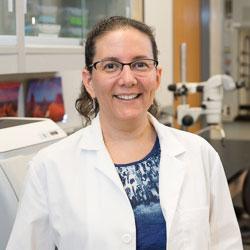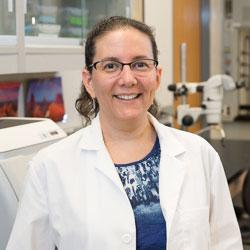
Credit: Sun Czar Belous
An interdisciplinary team of researchers has received a $2,098,880 grant to study how the complex movements of octopuses can be used to design a bio-inspired, soft-armed, autonomous robot.
The team, consisting of a biologist, a material scientist and four engineers, received the grant, entitled "Octopus-Inspired Autonomous Arms for Soft Robots with Adaptive Motions," from the Office of Naval Research.
"We want the robot to be adaptive to its environment," Rebecca Fisher, PhD, said. "The octopus is a good model for this project, as their arms are capable of sensing local conditions and achieving some movements without input from the brain."
Dr. Fisher, an Associate Professor in the Department of Basic Medical Sciences and Director of the Gross Anatomy Laboratory at the University of Arizona College of Medicine – Phoenix, is the biologist on the team. She received $316,000 to investigate the neuromuscular anatomy of octopus arms via Magnetic Resonance Imaging (MRI) and contrast-enhanced micro-Computed Tomography (micro-CT). Dr. Fisher will use the imaging core at the Barrow Neurological Institute to study the California two-spot octopus and the common octopus.
"As an anatomist, I am interested in form and function. How something is structured has specific effects on how that animal can move, and how that animal can capture its prey. I see this project as a natural marriage between biology and robotics."
In addition to her role at the UA College of Medicine – Phoenix, Dr. Fisher is an adjunct faculty member in the School of Life Sciences at Arizona State University. Her research laboratory is located on the ASU Tempe campus, which helped facilitate collaborations with ASU investigators, she said.
Dr. Fisher will be working with Daniel Aukes, PhD, an Assistant Professor of Engineering at ASU, and a specialist in design and rapid prototyping; Spring Berman, PhD, an Assistant Professor of Mechanical and Aerospace Engineering at ASU and a specialist in dynamics and control of bio-inspired robots; Hamid Marvi, PhD, an Assistant Professor of Mechanical and Aerospace Engineering at ASU and a bio-inspired roboticist; Matthew Peet, PhD, an Associate Professor in Mechanical and Aerospace Engineering at ASU and a specialist in control of partial differential equations and infinite-dimensional systems, and Ximin He, PhD, an Assistant Professor at the University of California, Los Angeles, and a material scientist with specialization in stimuli-responsive polymers and 3D printing.
"Octopuses are capable of complex movements, such as squeezing through tight spaces, grasping and carrying objects," Dr. Fisher said. "Previous studies have demonstrated that even detached octopus arms are capable of some movements. Our goal is to investigate how these appendages dynamically interact with their environment. To do this, we will be investigating the neuromuscular structure of octopus arms as well as their sensory and motor controls."
These methods will enable the researchers to visualize the complex 3D organization of tissues throughout the arm, including major nerves, specific muscle layers and the suckers. The biological studies will inform the design of the distributed sensors, actuators and controls of the robotic arms.
"The goal is to design a bio-inspired robot, consisting of a mantle and multiple arms, that is capable of responding to local conditions and performing multiple tasks," Dr. Fisher said. "Robots play many important roles in society today: in manufacturing, the military and health care. By studying animals that have amazing abilities, we can design more efficient and adaptive robots. It could really have an impact on people's day-to-day lives. "
###
The University of Arizona College of Medicine – Phoenix admitted its inaugural class of first-year medical students in August 2007 and is celebrating its 10th anniversary this year. The College inspires and trains exemplary physicians, scientists and leaders to optimize health and health care in Arizona and beyond. The College is uniquely positioned to accelerate the biomedical and economic engines in Phoenix and the State by leveraging vital relationships with key clinical and community partners. For more, visit phoenixmed.arizona.edu/tenyears.
Media Contact
Teresa Joseph
[email protected]
602-827-2657
http://uahs.arizona.edu/
Original Source
http://phoenixmed.arizona.edu/about/news/researchers-study-biology-octopuses-develop-autonomous-robots





